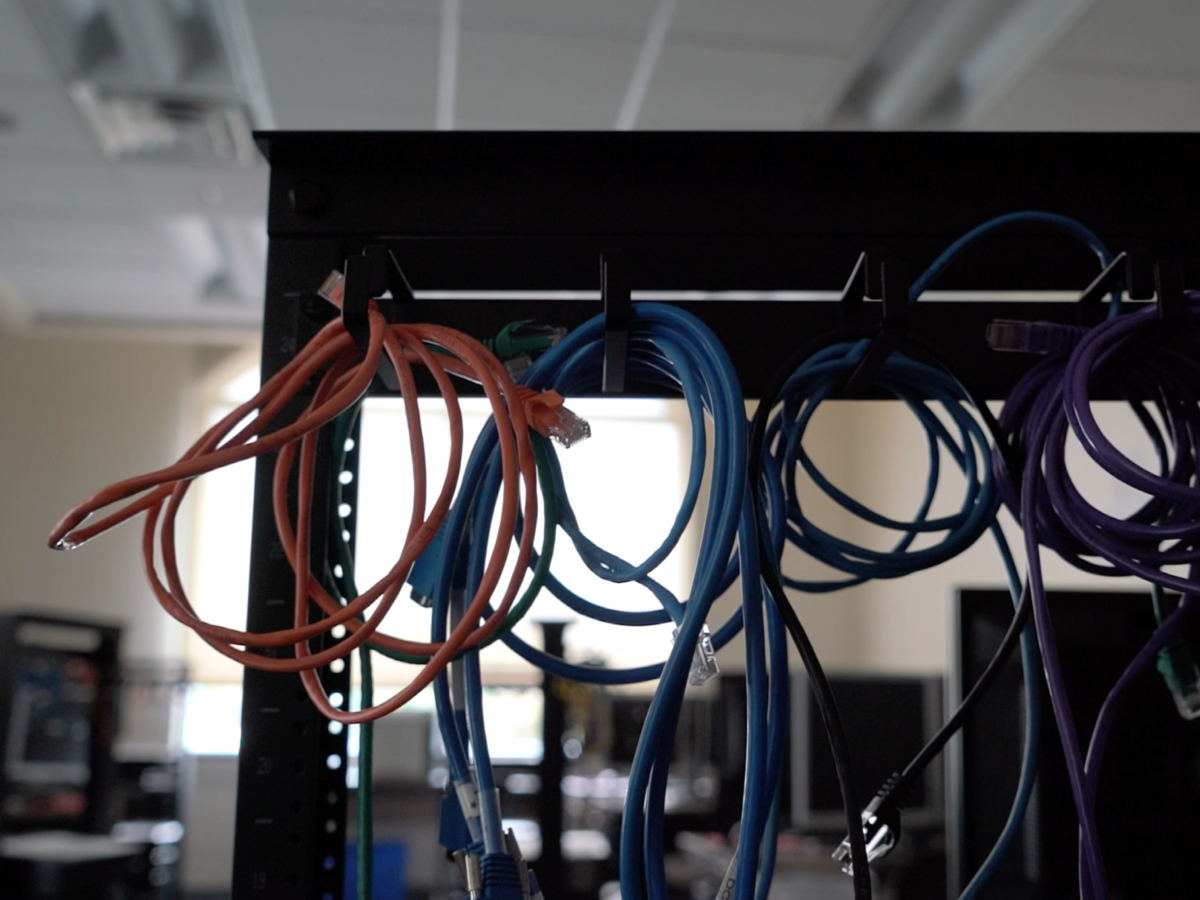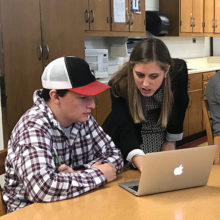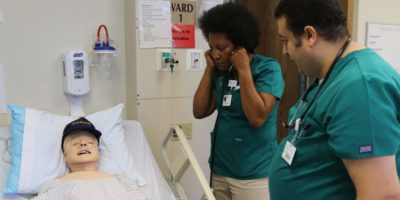
This article is part of the Solution Seekers series. Find the full series here.
On Aug. 21, Haywood County Schools went back to class virtually. Amidst this transition, the school system faced an unexpected hurdle on top of the stress of adjusting to school during a pandemic — a cyber attack. During their second week, Haywood County Schools cancelled classes due to a ransomware attack.
Haywood County Schools has cyber insurance but didn’t want to give in and pay the ransom. Due to the complexity of diagnosing infected computers and networks, the process of recovery from an attack like this one can take months.
Cyber attacks have been on the rise in recent years and have increased significantly during the pandemic. As our schools and government institutions fight off these attacks, the role of cybersecurity professionals has only gotten more important.
Before the pandemic, there were 500,000 open cybersecurity jobs across the country. North Carolina had 20,000 available cybersecurity jobs, and that number has likely increased with the impact of COVID-19.
In order to fill these jobs, the state needs more skilled applicants. This is why the Carolina Cyber Center and Fayetteville Technical Community College are working together to create the Carolina Cyber Network, a talent development partnership to close the workforce gap in the cyber field in North Carolina.
Cyber attacks on the rise
While the first objective of the Carolina Cyber Network is to fill the talent gap in the field, there is a second pressing objective. With cyber attacks on the rise, the importance of cybersecurity is increasingly relevant.
“We’re losing millions of dollars in intellectual assets and property values. I mean, if you think even when Richmond Community College was attacked last year, it took them literally about six to seven months to get fully back up and running. Well, that’s a lot of manpower, a lot of time, a lot of energy,” said Mark Sorrells, the senior vice president for academic and student services at Fayetteville Technical Community College.

Cybercrime costs North Carolina billions of dollars every year. And it isn’t just educational institutions that are at risk. Private businesses and state agencies are subject to these attacks as wells.
Right now many cybercrimes are focused on obtaining critical information on a COVID-19 vaccine.
“We’ve got a lot of intellectual property in the biotech and pharmaceutical industry,” Sorrells said.
“Every time you see an announcement about a vaccine potential, you see a spike in the cyber attacks that are trying to get information about that,” Sorrells said.
When it comes to school systems and other public agencies, there is a lot of sensitive data on the line.
“What’s going on is reposting public information. But whether it’s local entities like school systems, state agencies, or private sectors, we’re going to help develop and cultivate a workforce,” said Chris Herring, department chair of the Cyber Defense Education Center at Fayetteville Tech.
A gap in the field
“We hear from industry that by the time somebody graduates from a four-year institution, the technology changes so rapidly that they’re seven years behind. So we’re trying to reduce the cycle time between a person entering a program and when they can exit,” said Sorrells.

Fayetteville Tech is taking the lead on developing the new Carolina Cyber Network. With their Center of Academic Excellence ranking by the Department of Homeland Security (DHS) and National Security Agency (NSA) for their cybersecurity program and proximity to Fort Bragg, the school is in a unique position to steer this new endeavor. Fayetteville Tech serves numerous veterans, many of whom already have their security clearances, which makes them a great fit for the cybersecurity program.
The Carolina Cyber Network model
While the Carolina Cyber Network is just getting off the ground, Sorrells and Herring have big plans. The goal of the network is to better align the independent cybersecurity programs across the state using a hub-and-spoke model to create a talent development pipeline for the industry.
“[The] Carolina Cyber Network looks at a hub-and-spoke framework to build around Centers of Academic Excellence partners to begin scaling a comprehensive program of training — workforce development program — in cybersecurity,” Sorrells said.
As Sorrells explained, the “hubs” of the network will be the institutions that are Centers of Academic Excellence in cybersecurity, and the “spokes” will be regional partner institutions and businesses.
Development of the network will take place in three phases, the first of which has been funded by the state and has just started. In this first phase, they will develop the hubs and decide what the network’s governance structure will be.
Here’s the general plan for the phases with a funding breakdown:
Phase 1 – Curriculum & Hub Development
- $1.5 million for 8 months
- Goal to reach 300 students
Phase 2 – Scale-up from Hubs to Spokes
- $4 million for 12 months
- Goal to reach 1,000 students
Phase 3 – Scale-up Across State
- $4 million for 12 months
- Goal to reach 3,000 students
The Carolina Cyber Network is looking to partner with community colleges and four-year universities. As of now, the network is working with Montreat College as their four-year institution partner. They have worked together to develop the four-year cybersecurity program, which will allow community college students to continue their education in the field if they so choose.
“We’re looking at building regional capacity,” Sorrells said.
“We’re looking at it from a more holistic standpoint.”
Regional capacity will be determined by the network’s ability to build partnerships in different areas. Right now, they are considering bringing the following schools into the network to help build its impact:
- Wayne Community College
- Sampson Community College
- Wake Technical Community College
- North Carolina State University
- Forsyth Technical Community College
- NC A&T University
- Elizabeth City State University
- Gaston College
- Catawba Valley Community College
Solidifying these partnerships is no easy feat. According to Sorrells, it’s the network’s biggest obstacle right now.
“The biggest challenge right now is, and I think will be, getting more alignment from all the educational players,” said Sorrells. The college is hoping to align coursework with their partner institutions to allow for more seamless attainment of credentials and degrees. With numerous institutions, some of them being community colleges and others four-year universities, course alignment can be difficult.
Helping students find their path
Cybersecurity is a large field, and the network hopes to expose students to all of its opportunities, starting in high school. Fayetteville Tech has five cybersecurity academies at the high school level where college instructors will work with high school teachers on classes and experiences for their students. They also have opportunities for high school students who want to come on campus and learn. These students can leave with certificates to show for their coursework.
“The premise is to try to help folks transitioning into the cyber sector,” said Herring
“We always recommend working backwards. Because IT as a whole, information technology, is a massive tree. Then cyber is a branch of the tree, and even off of that branch, there’s a lot of small branches,” said Herring.
One student, Jesse Watts, found his way to Fayetteville Tech upon retiring from the military after 20 years. He is currently double majoring in network administration and cybersecurity.
“When I was in the military, I was in the medical field. And after 20 years of doing that, I pretty much was bored, I guess you could say, or wanting to try something new,” said Watts.
He asked himself what he could do next and where he could contribute.
“Technology’s not going anywhere anytime soon. If anything, it’s advancing more and more each and every day. And so computers for me was the next logical step,” said Watts.
When choosing a school, Watts did his own research to find the best fit.
“Fayetteville Tech had one of the top programs that I researched. I had some soldiers who were taking classes here, heard a lot of good things about it, came on campus, looked around, talked to some of the staff and faculty here. I liked the feel that I got here. And so I just felt that this was the right place for me.”
According to Watts, the staff make the program so unique.
“They take a personal interest in your education, and they show a sense of actually caring about you succeeding,” said Watts.
Once he graduates from Fayetteville Tech, Watts plans to join the workforce. However, his educational journey won’t end here. He shared that he wants to go on to get his bachelor’s and maybe even master’s in cybersecurity or computer science.
Just the beginning
The Carolina Cyber Network is in the first phase of implementation, but it is actively planning for the phases ahead. This network is focusing on the cybersecurity talent pipeline, but they believe the model could scale to other industries. North Carolina has many workforce needs, and Fayetteville Tech hopes to spread this project’s framework to other industries to meet those needs.
Behind the Story
Molly Osborne and Alli Lindenberg did the reporting for this story. Alli Lindenberg shot the footage and wrote the article. Robert Kinlaw produced the video.






